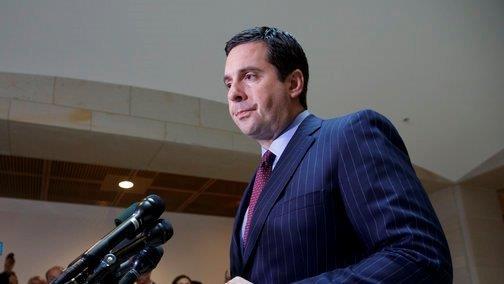Under Investigation, Trump Ally Steps Down from House Russia Probe
The Republican head of a congressional inquiry into alleged Russian meddling in the 2016 U.S. presidential election said he would temporarily step aside from the probe on Thursday because he is under investigation for disclosing classified information.
Devin Nunes, chairman of the House of Representatives Permanent Select Committee on Intelligence and an ally of Republican President Donald Trump, described charges that he made unauthorized disclosures of classified information as "entirely false and politically motivated."
The surprise disclosure that Nunes was under investigation added new uncertainty to the wider Russia probe his committee is carrying out. The investigation is one of several in Congress examining whether Russia tried to influence the election in Trump’s favor, mostly by hacking Democratic operatives' emails and releasing embarrassing information. Russia denies the allegations.
The House Ethics Committee issued a rare statement saying it would investigate allegations Nunes may have made unauthorized disclosures of classified information "in violation of House Rules, law, regulations, or other standards of conduct."
Nunes said in a statement that he had decided to step aside from the Russia investigation to fight the allegations and wanted "to expedite the dismissal of these false claims."
Representative Mike Conaway, the most senior Republican on the intelligence committee, will be the new leader of the probe.
The top Democrat on the panel, Representative Adam Schiff, said Nunes' decision to step aside from the probe was made in "the best interests of the committee, and I respect that decision."
Democrats have criticized Nunes, a member of Trump's transition team, for his handling of the Russia investigation after he received information at the White House, held a news conference about it and briefed Trump on it, all before sharing it with other members of his committee.
The ethics investigation stems from whether Nunes disclosed classified information while publicly discussing the contents of foreign intelligence reports.
Nunes and his spokesman have insisted that no classified information was revealed, but Democrats and former intelligence lawyers said it was clear he had done so. Nunes himself at one point said during his March 22 news conference that what he was discussing was "all classified information."
Trump sparked a controversy in early March when he tweeted, without giving evidence, that Obama had wiretapped him while the New York businessman competed with Democrat Hillary Clinton in the 2016 presidential race.
Two and a half weeks later, Nunes held a news conference saying an unidentified source had shown him intelligence reports containing "unmasked" names of Trump associates who were incidentally caught up in routine foreign surveillance.
Immediately after Nunes' news conference, critics argued that he had disclosed classified information in what many saw as an effort to provide cover to Trump's wiretapping claim and to distract from the wider Russia investigation.
Nunes said the surveillance of Trump associates appeared legal but expressed concern that names of U.S. citizens may have been improperly revealed in the reports and widely disseminated among government officials.
That allegation, in turn, has kicked off an evolving, unsubstantiated controversy about whether the Obama White House tried to spy on the incoming Trump administration.
A House of Representatives’ rule, first reported on by The Daily Beast, requires an ethics probe of "any unauthorized disclosure of intelligence or intelligence-related information."
U.S. foreign intelligence activities are classified, but the president can authorize the release of information about them. It is not clear whether Trump authorized Nunes to discuss the foreign surveillance.
The ethics probe came just weeks after Nunes and other Republicans on the House Intelligence Committee used a public hearing with FBI Director James Comey to decry leaks of classified intelligence to the media that have fueled concern about Trump's ties to Russia and led to the ouster of former national security adviser Michael Flynn.
(By Patricia Zengerle and Dustin Volz; Additional Reporting by Amanda Becker, Susan Heavey David Alexander and David Morgan; Editing by Alistair Bell and Jonathan Oatis)




















